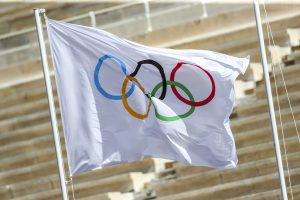With less than five days until the opening of the Tokyo Olympics, three cases of COVID-19 have been confirmed in the Olympic village. The first case of coronavirus was confirmed in a non-athlete on the South African team. Then two South African soccer players tested positive, which is raising fears of an emerging outbreak.
Japan is in the midst of a fourth state of emergency, with daily infections in Tokyo exceeding 1,000 for four consecutive days. The majority of the Japanese public are opposed to holding the Olympics over fears that infections will worsen with the influx of international athletes and officials. Already, the decision had been made to ban all spectators at the Games.
The chief of the Olympic Organizing Committee’s main operations center said infections are under control, and that the operations center will “create a safe environment through testing and by quickly isolating those who test positive.”
On Thursday, International Olympic Committee President Thomas Bach insisted there was “zero” chance of participants infecting Japanese residents with COVID-19. But so far 55 positive infections have been detected outside the village among people connected to the Olympics such as athletes, personnel, and delegates.
The athletes’ village is meant to be a bubble for 11,000 athletes who have travelled to Japan for the Games. Last year the IOC vowed that the purpose-built athletes’ village “must be the safest place in Tokyo.”
The Tokyo Olympic playbook outlines rules to prevent infections for volunteers, athletes, and media personnel during their stay in Japan. Athletes are not required to quarantine and are only permitted to travel to their assigned competition venues. Each individual sport also has a contingency plan in case a competitor tests positive for coronavirus, so that a confirmed infection won’t necessarily mean disqualification.
According to the playbook, accredited media personnel, official delegates, and other Olympics-related staff staying outside the athletes’ village are not allowed to use public transport within 14 days of entering Japan and can only visit locations submitted for approval in advance. The playbook allows Olympic participants to visit convenience stores and order takeout from restaurants within 14 days of arrival on the condition there is official supervision.
The reality is that athletes and delegates are testing positive after arriving with negative tests, which is drawing attention to the effectiveness of infection control measures at hotels that are housing both Olympic-related personnel and the general public. Opposition lawmakers have also raised serious concerns over the lack of monitoring for rule breakers.
A manager of an official Tokyo Olympics hotel told NHK that although one Olympics official is present in the hotel lobby, there is no communication with or monitoring of Olympic participants and domestic guests coming and going from the same entrance. Local media interviewed a media person from the Netherlands, who admitted to not reading the playbook and leaving the hotel to explore the distance to the International Broadcasting Center. A delegate from Africa who was interviewed at the famous Toyosu fish market said they had left their room to “stretch their legs” after arriving in Japan the same day, without supervision of an Olympic official.
The 70,000 athletes participating in the Games are meant to be under a strict “bubble” as soon as they land at the airport. But at one stage at Haneda airport, Olympic athletes and the general public were arriving through the same arrivals gate, albeit through separate partitions. Haneda airport also allows both Tokyo 2020 officials and the general public to use the same elevators and use the same cafes in the arrival lobby.
Bach also expressed confidence that the coronavirus countermeasures were functioning properly, despite a member of the Ugandan Olympic team – Julius Ssekitoleko, a weightlifter – going missing after failing to turn up for a scheduled PCR test. Several other members of the Ugandan Olympic team had previously tested positive for COVID-19.
Bach is hopeful that public skepticism and the mood will shift once Japanese athletes start competing and winning medals. He is even eager for a scenario where spectators are allowed. The decision to ban fans at the Olympics was made on July 8, but on Friday Bach’s off-the-cuff request to Prime Minister Suga Yoshihide to reconsider spectators if the infection rate improves struck a nerve with officials. Tokyo Governor Koike Yuriko responded that regardless of the Olympics the main priority is bringing down the infection rate as soon as possible. Suga said they would reconvene for talks on the matter if the coronavirus situation improves in Japan.
Omi Shigeru, chief of the government’s virus subcommittee, said he could not see a situation that would allow for spectators and stressed that the next few weeks will be crucial to controlling the spread of the virus. He urged against traveling across prefectures during the summer vacation, which coincides with the Obon Festival holiday on August 13 where people traditionally return to their hometowns to pay respects to their ancestors.

































